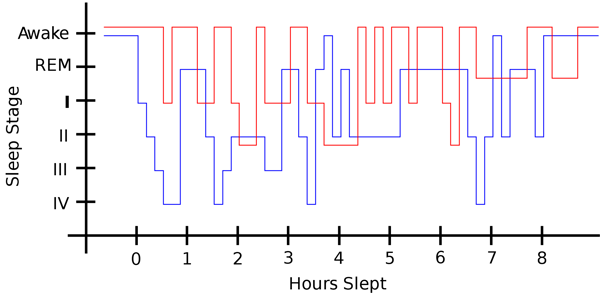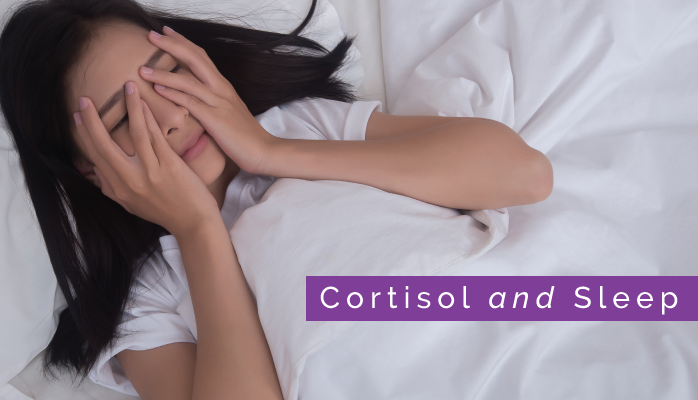Contributing factors to quality sleep
Sleep quality is impacted by many contributing factors. Sleep position, cortisol levels, dietary considerations, light exposure, and many more factors all play a role in sleeping. Many of us are looking for ways to improve our sleep quality, because of the myriad of benefits that high-quality sleep provides:
- Improved alertness and memory
- Reduction of chronic pain
- Reduced inflammation
- Increased energy levels
One of the most often overlooked factors for improving overall sleep quality is the body’s primary stress hormone: cortisol. Cortisol is an internal chemical signal that is released as a response to external or internal stressors.
Anxiety inducing situation increase cortisol levels in the body. For example, when you get pulled over and your heart rate increases, your palms become sweaty, and your breathing rate picks up, that is a sign of a cortisol boost. Cortisol is also an important regulatory hormone in the body that is at its peak levels in the morning. Continue reading to learn more about how cortisol can affect sleep.
How Cortisol Levels Affect Sleep
Now let’s be clear, there are several hormones and neurotransmitters responsible for sympathetic nervous system arousal. But the focus for this article is on cortisol. For a healthy individual, cortisol levels should be at their peak in the morning, and should be at their lowest in the late evening.
This rhythm is very important for training the body’s sleep cycles and energy rhythms. Low levels at night make it much easier to go to bed while high levels in the morning help you wake up get moving each day.
Stress-response in Nature
In nature, cortisol is extremely important for survival. If you are a zebra, and you are getting chased by a lion, you need to put your body on high-alert and get yourself out of there pronto! Let’s say you safely escaped the lion. For zebras, the cortisol levels immediately lower themselves back down and it would be time to return to grazing. The cortisol responds to external stimulus, and raising and lowering accordingly.
Now in humans, we have this big wonderful brain which can get itself caught in feedback loops. For example, we experience that same spike in cortisol and fight-or-flight reflex, but instead of it being a lion chasing us, it’s more likely that the stress is coming from that upcoming mortgage payment. Or the meeting you have tomorrow where what’s-his-face manager is going to attend. Or any other myriad stressor in life. We have a harder time down-regulating that stress response, because our brain can nearly ALWAYS find something stressful to zone in on and ramp up that stress response.
3 Practical Takeaways for improved Cortisol Regulation
Now that you know a bit about cortisol here are a few tips for regulating it well in day to day life.
This graph shows a normal sleep rhythm (blue) vs someone with poor sleep (red)
1. Reduce screen time at night.
Blue light stimulates the body and increases production of cortisol. Remember that cortisol levels are highest in the morning and that is in-part due to the signaling that blue light causes in the body. Blue light basically tells the body, “HEY WAKE UP!”. Try reducing screen time or wearing blue-light blocking glasses if you NEED to watch that most recent episode of the witcher.
2. Get sunlight in the morning.
Similar to why it’s important NOT to get blue light exposure in the evening, it’s just as important to SEEK sunlight in the morning. Sunlight is the best light for our bodies – it’s full spectrum and our body’s respond to morning sunlight with a cascade of biological training. Morning sunlight exposure will improve energy levels and facilitate improved sleep later in the day.
3. De-stress throughout the day.
Meditation, mindfulness, quiet-time and come in the form of taking a little time to close your eyes, take 3-5 deep breaths, and just relax the mind. An easy option is doing this in the bathroom, or after you park your car and before you walk into the home or into work. Taking a little time to relax the mind and focus on your breathing helps the body down-regulate the stress response and enter into “parasympathetic nervous system arousal”, which is a fancy way of saying, “relaxed, calm, restful” mode.
Incorporating these three tips can greatly reduce the negative impact of unregulated cortisol, and give the body the support it needs for an awesome night’s sleep, and energy upon waking. Reach out to us with a free sleep test if your cortisol levels are interfering with your sleep:


